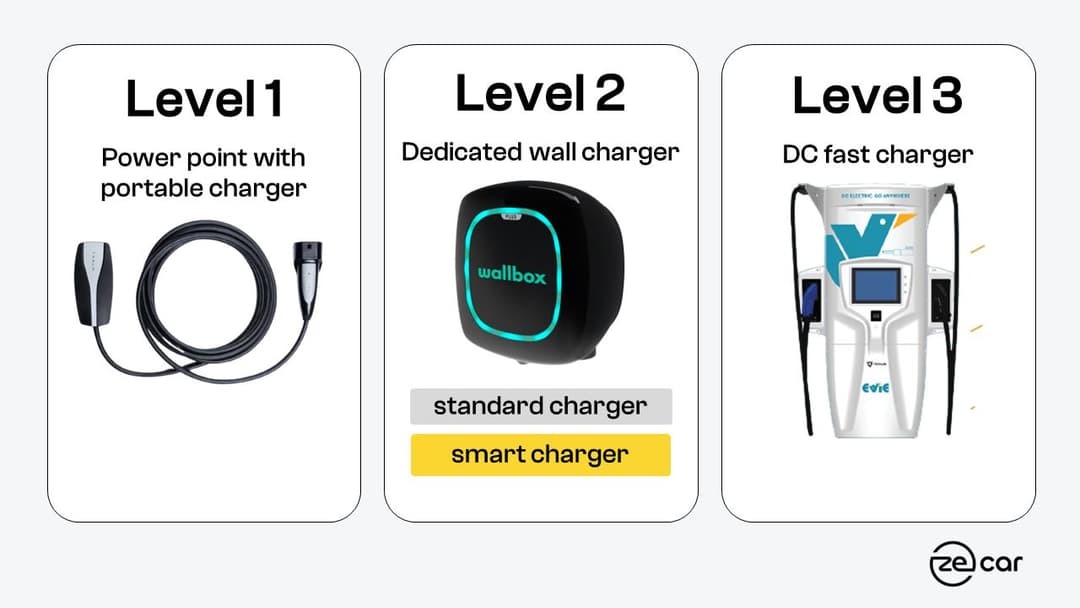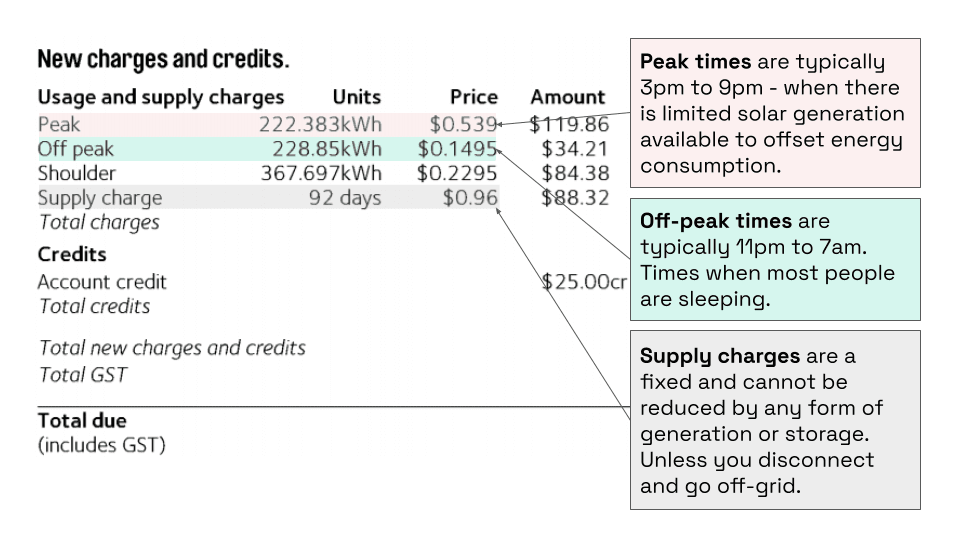
‘Smart’ devices are becoming an increasing presence in all aspects of our everyday lives. They are designed to save us time, money, and in the world of energy - optimise our resources. We have put together a guide that covers everything you need to know about smart EV charging, in particular:
- What is smart EV charging?;
- The differences between a smart EV charger and a regular charger; and
- How you can benefit from smart charging.
Smart electric vehicle charging refers to the use of various hardware and software technologies that facilitate load management in EV chargers (typically level 2). This guide will focus on smart chargers using ‘behind-the-meter’ configurations i.e. set by the home/business.

In the future, smart electric vehicle chargers will: communicate with the grid and be controlled by your electricity provider (along with other chargers) to provide stability to the electricity grid. Smart chargers will also feature bidirectional charging (V2G, V2H, V2L) however this is still a few years away from being commercially available. You can read more about how smart ev chargers can provide grid services in Origin’s Smart Charging Trial.
LEARN MORE
🔁 Watt is Bidirectional Charging, V2G, V2H, V2L?
What is a Smart EV Charging?
Smart EV charging refers to the use of intelligent hardware and software that automates and controls the charging of your electric car. Known as load management, the charger dynamically adjusts the power sent to your electric car based on preset configurations. It does this by reading the electric signals from various devices and managing and controlling the power flowing from your charger.
What this means is you can simply ‘set and forget’, with the peace of mind that your electric car will be charged the way you want it to without manual intervention.
A smart EV charger station comprises:
- Charging unit - A box that houses the intelligent hardware and software required for smart EV charging. It is generally attached to a charging cable.
- Wired/Wifi/Bluetooth connection - Data connection that allows the user to communicate with the charger, typically with an app.
- Smartphone app - All smart chargers are accompanied with a phone app that communicates with the charger and preset configurations.
Due to their higher power output, smart EV chargers typically fall within the ‘level 2’ category. Refer to our home charging guide for additional information on other levels.
Differences Between Smart EV Charger and Regular Charger
The primary difference between a smart EV charger and a regular charger is their capabilities and functionalities. While a regular charger delivers a fixed amount of electricity to the vehicle, a smart EV charger has the ability to regulate the flow of electricity, depending on the needs of the vehicle and your preferences.
Smart electric vehicle chargers communicate and share real-time data with multiple devices (car, solar inverter and switchboard) to automate charging based on your preferred configurations. Additional equipment such as power meters may be required to unlock the full suite of services smart chargers are capable of.
This allows for optimised charging schedules, remote monitoring, and integration with energy management systems, making the charging process more intelligent and efficient. We've highlighted the three main differences below.

1. Scheduled charging
In its simplest form, you can set the timeframe in which you want your charging to occur. For example, it is common for people to limit the charging window to off-peak times to take advantage of lower electricity rates. You could also set the times to align with the hours when your solar system is generating the most energy. The chart below shows charging commencing at 10 pm and ending at 6 am (if needed) when the electricity rate is at its cheapest.
The standard portable charger that comes with your electric car does not typically include scheduled charging as a feature. In the absence of your electric car having this feature, you would need to wait until 10 pm to plug the charger in to ensure you benefit from off-peak rates. Smart EV chargers automates this process for you.
A popular charger that features scheduled charging is the Myenergi Zappi.
The financial benefit of scheduled charging is highlighted in the table below. By limiting the charging window from 10 pm to 6 am (off-peak times), the driver reduces their charging costs by 74 per cent compared to charging at peak times. Over five years, this could add up to $5,545, which will likely exceed the cost of the smart charger.
If your electricity plan is on a flat tariff (same rate irrespective of the time of day), scheduled charging will not provide any financial benefit.
Some electric car models have scheduled charging functionality built into the car's software. This means you schedule your charging even with basic level 1 and 2 chargers (no smart functionality). The following vehicles have this feature"

2. Smart solar charging
The ability to charge your electric car from solar is one of the things that make electric cars truly revolutionary. Charging from purely solar means:
- The marginal cost of charging your electric car is almost zero; and
- The operation of your electric car is essentially zero-emission, a true zecar.
Solar charging stations communicate with your solar system and dynamically adjusts the charge rate based on the available generation of the solar system. Instead of exporting excess solar to the grid, it is diverted the available energy to charge your electric car. This will minimise your draw from the grid.
Smart solar chargers are beneficial in the following situations:
- The rated power of your charger is higher than your solar system; and
- When solar generation is intermittent.
In these instances, your smart charger calibrates its rated power (e.g. 7 kW) to what the solar system is generating (e.g. 3 kW). This ensures that you are harnessing the cleanest energy in the cheapest way possible.
Smart solar charging is available through smart chargers like the popular zappi or it can be enabled through software like an app called Charge HQ. Charge HQ will communicate with different chargers to control the charging. Currently on beta release, the app is available to download for free. You can read more about it here.
To illustrate the benefit of smart solar charging, we’ve compared a smart EV charger and a standard level 2 charger. The standard EV charger does not dynamically adjust, resulting in only 35% of the solar being utilised over two days. The smart solar electric car charger adjusts the charge rate in line with available solar, maximising solar generation and providing financial and environmental benefits.
3. Load balancing
Electric cars and Level 2 chargers can draw a lot of power from your home/business. Depending on your electrical wiring, the simultaneous operation of charging your car and home appliances could cause your power to trip.
The reason why this occurs is due to the aggregate load from your devices/appliances being greater than what your electrical switchboard can handle. Most grid-connected homes in Australia run on a single-phase 240V power supply and are limited to a maximum power draw of between 12 kW/50A to 20kW/80A. As demonstrated in the example below, you can see that if all the devices were switched on, it would cause a circuit overload and result in your power cutting out.
Similar to solar charging, the smart EV charger communicates with the circuits in your house and detects what the available load is. It then dynamically adjusts the power of the charger to ensure this limit is not exceeded and thus preventing a power trip.
The load balancing feature enables your charger to be used up to its maximum output and adjusts when demand is high in order to avoid tripping and causing a blackout. This means that you can have peace of mind that your home’s power is being protected by your smart EV charger.
Benefits of Smart EV Charging over Conventional Charging
Smart EV charging offers several advantages over conventional methods such as portable and non-smart wall chargers.
Convenience
The primary benefit of smart EV chargers is the convenience it provides in terms of time and ‘energy’ saved from speed and automation.
- Level 2 chargers (including smart) are anywhere between 50% (3.6 kW) to 900% (22kW) faster than charging from a standard 10A power outlet (2.4 kW). The actual charging speed however is limited by the power of the onboard charger in the car. For example the onboard charger in the MG ZS EV supports a maximum AC charge rate of 7 kW.
- Charging can be scheduled to your requirements e.g. solar generation, off-peak tariffs without the need for you to manually plug your charger in and out.
Saves money in the long run
- You will save money on your electricity bill by maximising your solar consumption and scheduling your charging to off-peak times.
- The thing to keep in mind is you are often paying a premium for this feature so you will need to weigh up the upfront cost of the purchase versus the saving in the long run.
Environmental benefits
- By purely charging your electric car with solar, you are minimising your carbon footprint. Above is a comparison of the carbon emissions of different fuels sources. As the Australian grid is still predominantly powered by fossil fuels, the environmental benefit is significant.
- In the future, you will be able to configure your charger to sync with times of maximum renewable energy generation on the grid. This also coincides when energy is at its lowest rate in the wholesale markets.
Do Smart EV Chargers Need Wi-Fi?
While Wi-Fi connectivity is not a strict requirement for smart EV chargers, it plays a crucial role in enabling their advanced features. Wi-Fi connectivity allows the charger to communicate with the grid, gather real-time data, and receive updates on energy pricing and demand. Additionally, it enables remote monitoring, control, and smart charging management through mobile apps or online platforms. In the absence of a Wi-Fi connection, some smart chargers have built-in 4G/5G capabilities for connectivity.
Can a Smart Charger Overcharge a Car Battery?
No, smart chargers are designed to prevent overcharging and protect the car battery. They incorporate advanced charging algorithms and safety mechanisms that constantly monitor the charging process. Once the battery reaches its full capacity, the charger automatically reduces the charging rate or stops the flow of electricity altogether, preventing overcharging and potential damage to the battery. Smart chargers prioritise battery health and safety, providing peace of mind to EV owners.
Smart EV Chargers of the Future
Two emerging areas we’ll look at in the future are:
Load management with energy provider
Several smart EV Charger pilot projects are currently being undertaken whereby the load of your EV charger will be dynamically adjusted to accommodate requirements of the grid. As EV’s become more popular, this type of smart EV charger will start becoming a standardised service. As of the time of writing, Endeavour Energy is providing a complimentary smart EV charger valued at $3000 to participate in its smart electric vehicle charging trial.
Bidirectional charging
Smart charging features such as bidirectional charging (V2G, V2H, V2L) are becoming a key feature in smart EV chargers of the future. Saying this, we are still several years away before they start becoming a presence in the marketplace. You can read more about how this future looks in our feature guide “Watt is bidirectional charging, V2G, V2H, V2L?”
Smart EV Charging FAQs
About the author
Stay up to date with the latest EV news
- Get the latest news and update
- New EV model releases
- Get money savings-deal

